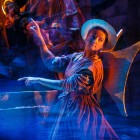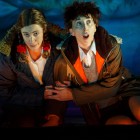Hansel and Gretel 2022Royal Conservatoire of Scotland
Read more about the opera Hansel and Gretel
Humperdinck’s Hansel and Gretel was premiered at Weimar on 23rd December 1893.
This work has been associated with Christmas ever since, a relationship underlined in this production's opening passage by the appearance of a Salvation Army band. Given the seriousness of its subject matter that connection sometimes seems slightly perverse, although the fairy story does occasionally turn up as the subject matter for pantomime.
The piece fundamentally deals with childhood poverty and hunger. There is a clear dichotomy in the characterisation of the Witch - a seriously evil figure who can at the same time be played for laughs. At the entrance to the RCS auditorium there was a warning for the audience that there would be hints of cannibalism, as if this was likely to come as news to spectators. The updated concept involved the Witch as a Celebrity Chef launching a new Christmas cookbook “Cooking with Children”.
Some years ago Scottish Opera mounted a production by Peter Ebert which linked the starving children with hints of the concentration camps. Here the Witch's spick and span kitchen had numerous children in storage - chilled or frozen - awaiting the chef's culinary attentions. In those circumstances it seemed perhaps surprising that she was clearly so intent on preparing fresh meat - Hansel - for the pot.
The most successful element of this production was musical. The reduced orchestration by Derek Clark, prepared some years ago for Scottish Opera, was used, though there were plenty of players in the pit. The sounds produced by young conductor Adam Hickox were still thoroughly Wagnerian. The two title roles are awkward to cast as the performers need to be believable as teenagers while needing powerful voices. This pairing was highly successful, with Ascelina Klee a near ideal Hansel in stroppy teenager mode. Elena Garrido Madrona was equally fine as Gretel, no doubt assisted by the reduced orchestration.
At the second performance the parents were given large-scale dramatic treatment by Amy Strachan and Toki Hamano. The use of a tenor as the Witch always allows an accentuation of the grotesque, and here Cameron Mitchell gave a delightful interpretation, perhaps just slightly lacking the vocal cutting edge that would have been ideal. The Sandman and Dew Fairy both made a positive impression in short ''cameo'' roles.
Director Stephen Lawless has had a long and successful international career, working with Scottish Opera a couple of years ago (Kátya Kabanová). His decades of experience will have been of great use to the students. The basic box set for the first and last domestic interiors worked well, with very different furnishings. The oven did not really work, with the Witch virtually climbing into it with little assistance. But her continued appearance inside briefly gesticulating for help was a useful novel touch. There were hints of a Glasgow location in Adrian Linford's designs, embellished with hints of old master or Breughelesque figures. The Dew Fairy was clearly hung over from a night out clubbing, and had gained a traffic cone on her way home.
This was a thoroughly enjoyable staging of a deceptively difficult piece. The audience was enthusiastic but horribly sparse. Clearly word had not got round to the regulars that the opera school was up and running again. The next staging, in March, is Jonathan Dove's successful comedy Flight. Let us hope that Covid and the social restraints around it continue to improve and that this next production will receive appropriate audience support.
Performance Cast
- Hansel
- Gretel
- Gertrude mother of Hansel and Gretel
-
Lindsay Grace Johnson (Jan 20, 24)
Amy Strachan (Jan 22, 26)
- Peter a broom maker and father of Hansel and Gretel
-
Jonathan Forbes Kennedy (Jan 20, 24)
Toki Hamano (Jan 22, 26)
- Sandman
- Dew Fairy
- Witch



